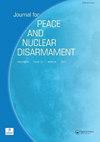Promoting Nuclear Disarmament through Bilateral Arms Control: Will New START Extension Pave the Path to Disarmament?
IF 1.4
Q4 INTERNATIONAL RELATIONS
引用次数: 3
Abstract
ABSTRACT The United States and Russia agreed to extend the 2010 New START Treaty in February 2021. Many analysts believed that this step would reinvigorate the US-Russian arms control process, lead to deeper reductions in nuclear weapons, and possibly pave the path to nuclear disarmament. However, the United States and Russia might find it difficult to agree on an agenda for the next round of arms control negotiations, and neither may be willing to accept deeper reductions in their numbers of nuclear weapons. Changes in the international security environment, stresses in the US-Russian relationship, and increases in the size and scope of China’s nuclear arsenal may all impede progress. As a result, the next steps in arms control may focus on transparency, communication, norms, and risk reduction measures, both as a way to mitigate the risk of nuclear war and to, possibly, create the conditions needed for further reductions in the future.通过双边军备控制促进核裁军:新的《削减战略武器条约》延期会为裁军铺平道路吗?
摘要美国和俄罗斯于2021年2月同意延长《2010年新削减战略武器条约》。许多分析人士认为,这一举措将重振美俄军控进程,导致核武器的进一步削减,并可能为核裁军铺平道路。然而,美国和俄罗斯可能会发现很难就下一轮军备控制谈判的议程达成一致,也可能都不愿意接受进一步削减核武器数量。国际安全环境的变化、美俄关系的紧张以及中国核武库规模和范围的扩大都可能阻碍进展。因此,军备控制的下一步可能侧重于透明度、沟通、规范和降低风险措施,这既是减轻核战争风险的一种方式,也是为未来进一步削减核武器创造条件的一种可能方式。
本文章由计算机程序翻译,如有差异,请以英文原文为准。
求助全文
约1分钟内获得全文
求助全文
来源期刊

Journal for Peace and Nuclear Disarmament
INTERNATIONAL RELATIONS-
CiteScore
1.30
自引率
0.00%
发文量
36
审稿时长
12 weeks
 求助内容:
求助内容: 应助结果提醒方式:
应助结果提醒方式:


